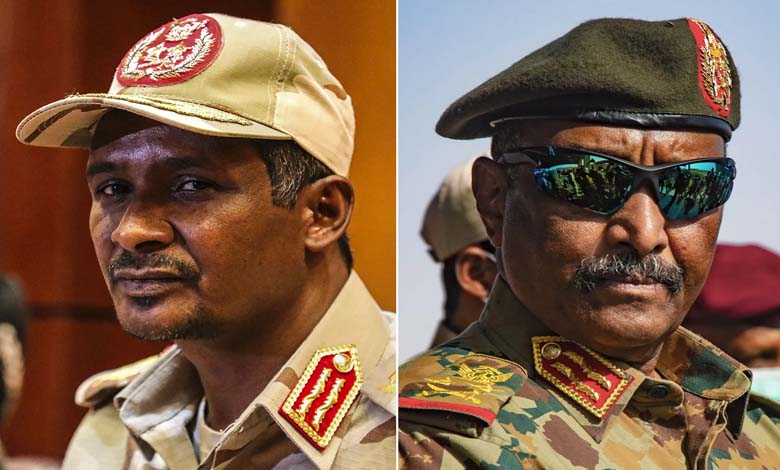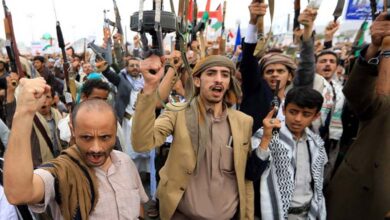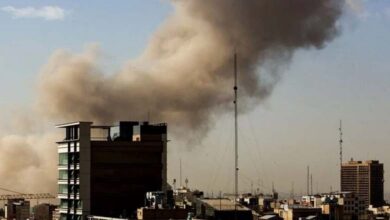Sudanese Rapid Support Forces leader threatens to pursue Abdul Fattah al-Burhan and calls on the army to withdraw from the fighting

The leader of the Rapid Support Forces in Sudan, Mohamed Hamdan Dagalo, known as ‘Hemeti,’ launched a scathing criticism of the Sudanese army commander and head of the Transitional Sovereignty Council, Abdul Fattah al-Burhan, accusing him of committing war crimes and attempting to restore power to the previous regime.
Hemeti, who had remained out of the spotlight since the conflict began, broke his silence on Monday evening by posting a 20-minute voice message on social media, in which he presented his perspective on the situation since the conflict began up to the present day.
In his audio message, which was posted on the Rapid Support Forces’ account on the X platform (formerly Twitter) and widely circulated on social media, Hemeti leveled harsh criticisms at Al-Burhan. He revealed some of their conversations before the outbreak of armed conflict, explaining that the army commander was the one who initiated the war.
He was keen to debunk the misconceptions that Al-Burhan had attempted to propagate in previous statements. Al-Burhan had claimed that the number of Rapid Support Forces had decreased, while Hemeti asserted that their numbers had increased by about a third, with the addition of several factions, including the Tamazuj movement, in addition to tribal support. He emphasized his commitment to continue fighting “until the last soldier of the Rapid Support Forces,” asserting that his forces control the three capital cities.
He also called on the army to withdraw from the fighting, pointing out that his battle is with Al-Burhan and the remnants of the ousted regime.
Hemeti’s speech comes as Sudanese army commander Abdul Fattah al-Burhan returned to Port Sudan after a visit to South Sudan on Monday, where he discussed developments in the Sudanese conflict. Meanwhile, the United Nations announced that it needs an additional one billion dollars, warning of an increase in the number of conflict refugees by the end of 2023.
The Sovereignty Council, the current highest authority in Sudan, announced that Al-Burhan had arrived in Port Sudan on the Red Sea after his Monday talks with South Sudan’s President Salva Kiir, who had previously rebelled against Khartoum and declared his country’s independence in 2011. They discussed “efforts made by regional countries, especially South Sudan, to address the crisis in Sudan,” according to the same source.
Since the independence of South Sudan, Kiir has become the traditional mediator in the Sudanese crisis. South Sudan’s government affairs minister, Martin Elia Lomoro, said, “It is known that President Kiir is the only person who has knowledge about Sudan and can find a solution to the Sudanese crisis.”
This is Burhan’s second foreign visit since the conflict between the army, under his leadership, and the Rapid Support Forces, led by his former ally Mohamed Hamdan Dagalo, erupted on April 15th of last year. Burhan has effectively ruled Sudan since he staged a coup in 2021.
Burhan visited Egypt on August 29th, where he met with President Abdul Fattah al-Sisi in the city of El-Alamein, and shortly after that visit, the first Egyptian civilian aircraft landed in Port Sudan.
The two external stops for Burhan come amid reports of negotiations between him and Dagalo outside the country, seeking a solution to the conflict.
The war has led to the death of at least five thousand people and the displacement of 3.6 million internally in the country, in addition to the flight of another million people to neighboring countries.
Chad is one of the most prominent countries that has received large numbers of Sudanese refugees, with more than 400,000 people fleeing to it. Egypt follows with 287,000, and South Sudan with 248,000.
In May, the United Nations requested funds to assist refugees but received only a quarter of its needs. On Monday, it requested an additional billion dollars, confirming that “those arriving in remote border areas find themselves in desperate conditions.”
Many of them live in makeshift camps without infrastructure or access to shelter, water, or food. Susanna Borges of Doctors Without Borders confirmed that in Chad, for example, “some people have not received food for five weeks.” She sadly stated, “People feed their children insects, herbs, and tree leaves,” exacerbating the health crisis while humanitarian workers face many cases of “malaria, diarrhea, and malnutrition.”
The United Nations also reminded that epidemics, especially cholera and measles, are spreading among refugees, leading to some deaths. Mamadou Baldé, the regional director of the UN High Commissioner for Refugees in East Africa and the Great Lakes Region, said in a statement, “It is very sad to receive reports of children dying from diseases that can be completely prevented if partners have sufficient resources.”











